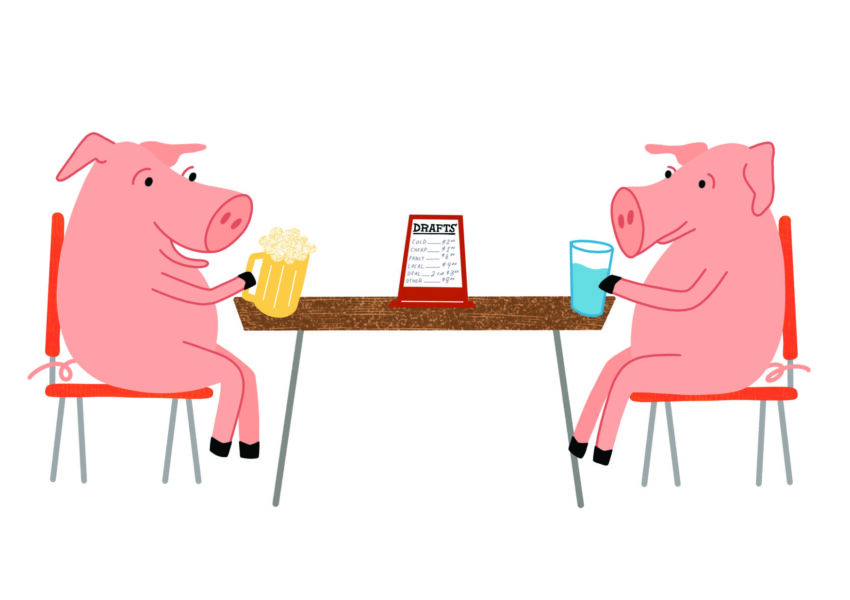Here’s Looking at ’Cue Two Virginia pitmasters carry on a legacy
By Debra Freeman
Photos by Joshua Fitzwater and Matt Wade
![]()
Turn on the television or take a look at food media. Folks would have you believe there’s barbecue in every Southern state except for Virginia. The birthplace of eight American presidents just happens to be the birthplace of American barbecue, and it’s time everyone knew that Black pitmasters from Virginia got to the pits first.
American barbecue is a mix of contributions from Native Americans, European settlers, Africans, and early African Americans. Captain John Smith wrote that the Powhatan Indians at Jamestown would construct apparatuses that were sticks raised above the ground on posts with forked tops. Eventually, this approach began to evolve, with enslaved African Americans at the helm of the cooking process. According to Michael W. Twitty, author of The Cooking Gene, “working over pits in the ground covered in green wood—much as in West Africa or Jamaica…it was enslaved men and their descendants, not the Bubbas of today’s Barbecue Pitmasters,” who perfected the technique.

As early as the seventeenth century, barbecued meats were fairly common at Virginia gatherings. Although hogs were typically the protein of choice, squirrel, venison, and oxen were prepared as well. By the mid-eighteenth century, the word “barbecue” was synonymous with a gathering that included meats cooked over coals. In 1799, the Irish writer Issac Weld wrote about his travels to Virginia, and specifically remarked about barbecues in the state, “The people in this part of the country, bordering the James River, are extremely fond of an entertainment which they call a barbacue (sic). It consists in a large party meeting together, either under some trees, or in a house, to partake of a sturgeon or pig roasted in the open air, on a sort of hurdle, over a slow fire.”
By the early 1800s barbecue was so entrenched in Virginia history that Americans thought of the state as barbecue’s “original habitat,” as noted in the Weekly Messenger in 1825. In 1841, the Southern Literary Messenger referenced “that Virginian Saturnalia—a Barbecue.” James Hammond Trumbull, a nineteenth century scholar, wrote in 1872 that barbecue was so connected to the state that it should be considered a “Virginian word.”

Enslaved pitmasters dug pits, chopped wood for coals, tended the fire all night long, butchered the hogs, made mopping sauces for basting, and cooked and flipped the hogs. Enslaved and free Black Virginia pitmasters like Thomas Griffin, Juba Garth and his wife, Mandy, John Gilmore, John Dabney, Jasper Crouch and thousands of other men and women toiled in the trenches.
Griffin was a free man of color who owned two popular restaurants in the 1850s, The American Saloon No. 84 and Tom Griffin’s Restaurant, both in Richmond. His specialties were barbecue and Brunswick Stew. After his death, a reporter for the Daily Dispatch wrote about the greatness of his barbecue.

After Dabney purchased freedom for his wife in 1856, he began making payments for his own freedom, but before he finished the installments, slavery had ended, and he chose to pay the balance to his owner. After the Civil War, he became a caterer and restauranteur in Richmond where he was in charge of many large barbecues. Dabney eventually owned several restaurants, including the Senate House Restaurant, which was described by the Richmond Whig newspaper as a “first-class restaurant.” He was also known for being a talented mixologist.
Today, Black pitmasters like Sam Clayton and Alex Bazemore are working to keep those traditions alive. Both men honed their skills by cooking whole hogs in barbecue competitions, and Bazemore runs a catering business in Suffolk, where his barbecue turkey and pork are highly regarded. For the past two years, Clayton and Bazemore have recreated the steps taken more than 400 years earlier to prepare a traditional Virginian whole hog. They leverage the past to showcase the role of Black Virginians in America’s barbecue story, then and now.
Debra Freeman writes about the intersection of race, culture, and food. She has written for Plate Magazine, Pit Magazine, Gravy, Epicurious, Southern Grit Magazine, Garden and Gun, and Gastro Obscura.
SIGN UP FOR THE DIGEST TO RECEIVE GRAVY IN YOUR INBOX.




